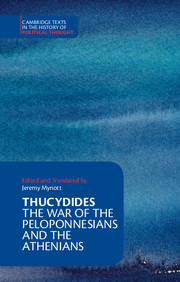Book contents
- Frontmatter
- Contents
- List of Maps
- Preface
- Introduction
- Principal dates
- Biographical notes
- Greek deities, heroes and mythological figures
- Greek terms for distances, coinage and the calendar
- Map 1. Greece and the Aegean
- Map 2. Peloponnese and Central Greece
- Map 3. Western Asia Minor and Hellespont
- Map 4. Sicily and South Italy
- The War of the Peloponnesians and the Athenians
- Appendix 1 Notes on the Greek text: variations from the OCT
- Appendix 2 Thucydides in the ancient world: a selection of texts
- Bibliography and further reading
- Synopsis of contents
- Synopsis of speeches
- Glossary
- Index of names
- General index
- References
Appendix 2 - Thucydides in the ancient world: a selection of texts
Published online by Cambridge University Press: 05 April 2013
- Frontmatter
- Contents
- List of Maps
- Preface
- Introduction
- Principal dates
- Biographical notes
- Greek deities, heroes and mythological figures
- Greek terms for distances, coinage and the calendar
- Map 1. Greece and the Aegean
- Map 2. Peloponnese and Central Greece
- Map 3. Western Asia Minor and Hellespont
- Map 4. Sicily and South Italy
- The War of the Peloponnesians and the Athenians
- Appendix 1 Notes on the Greek text: variations from the OCT
- Appendix 2 Thucydides in the ancient world: a selection of texts
- Bibliography and further reading
- Synopsis of contents
- Synopsis of speeches
- Glossary
- Index of names
- General index
- References
Summary
This is a selection of texts from the ancient world commenting directly on Thucydides’ life and work. There exist two extended treatments – by Dionysius (mainly on his style) and ‘Marcellinus’ (mainly on his life) – but it is perhaps surprising how few other direct sources of this kind there are, given Thucydides’ great celebrity and influence.
Cicero (106–43 BC). Roman orator, statesman and philosopher. He played an active part in Roman politics before the death of Caesar, delivered many important political speeches and wrote major treatises on rhetoric and philosophy.
Brutus. A study of the history of oratory, cast in the form of a dialogue.
Cicero is describing the origins of the art of oratory in Greece, and in particular in Athens:
(1) It was in that city that the orator first came into prominence and where oratory began to be committed to written records. But before Pericles, who is credited with some writings, and Thucydides – who belong not to the infancy of Athens but to her maturity – there is not a single example of the written word that shows any degree of elaboration at all or looks like the work of a real orator. [He then mentions various earlier figures famous for their eloquence] … And after them came Pericles, who excelled in every way but was especially renowned for this ability. We also know that in the same period Cleon, for all the trouble he caused as a citizen, was a man of eloquence. Among his near contemporaries were Alcibiades, Critias and Theramenes, and it is from the writings of Thucydides that one can best understand the style of speaking that flourished at that time: these were impressive in their choice of words, full of wise sayings, and so concise through their compression of material as to be sometimes obscure. (Brutus 26–29)
- Type
- Chapter
- Information
- ThucydidesThe War of the Peloponnesians and the Athenians, pp. 591 - 608Publisher: Cambridge University PressPrint publication year: 2013



